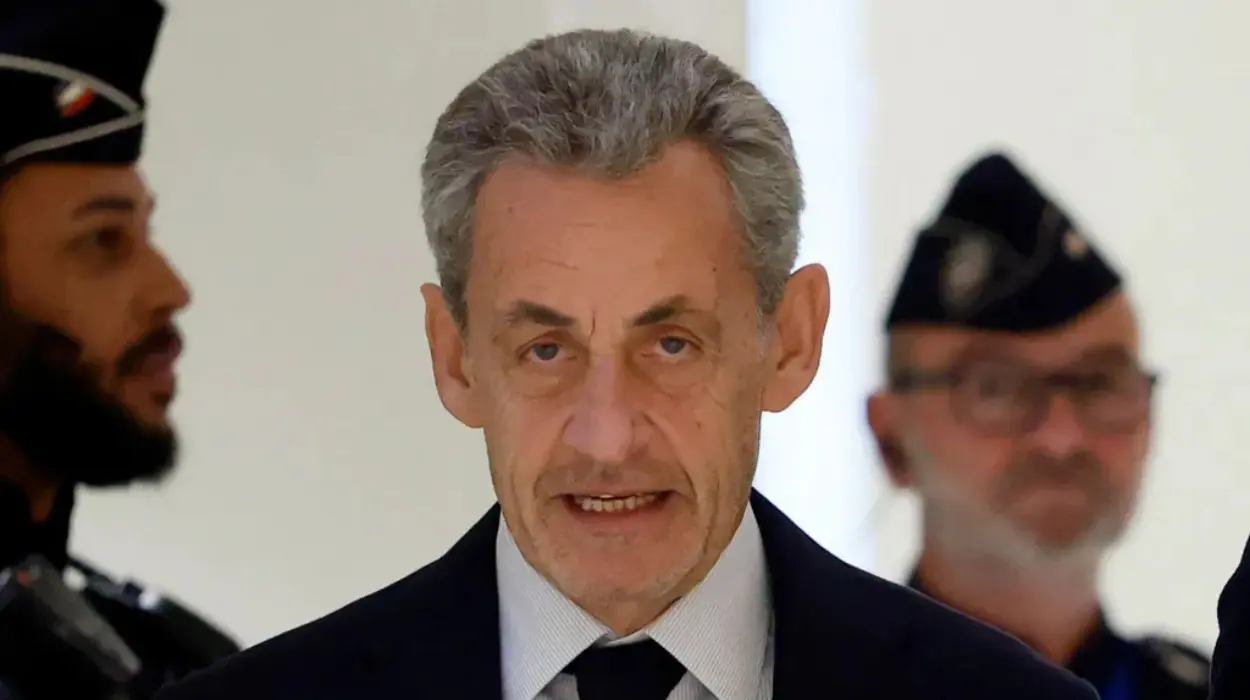Paris (Parliament Politics Magazine) – Former French President Sarkozy found guilty of criminal conspiracy over alleged Libyan campaign funds; his ex-chief of staff also convicted of corruption.
As reported by The Telegraph, Nicolas Sarkozy was convicted of criminal conspiracy but cleared of corruption and other charges.
Allegations about Nicolas Sarkozy in the Gaddafi funding case
Former President Nicolas Sarkozy was accused of accepting millions of euros from late Libyan leader Muammar Gaddafi.
He was charged with
“concealing the embezzlement of public funds, passive corruption, illegal campaign financing and criminal conspiracy with a view to committing a crime.”
Sarkozy rejected all allegations during the three-month trial, calling it politically motivated. He can appeal, pausing sentencing, while prosecutors demand a seven-year sentence.
He becomes the first ex-French president found guilty of taking illegal foreign funds for the election. This marks the first time since World War II that an ex-head of state is convicted.
The former president appeared in court with his wife, singer and model Carla Bruni-Sarkozy, and their three sons.
Sarkozy’s link to Libyan cash transfers
In court, Judge Nathalie Gavarino said Sarkozy allowed his aides to act in pursuit of financial support for his campaign.
Investigators claim Sarkozy conspired with Libya to secretly fund his campaign, involving spies, a convicted terrorist, and arms dealers, with reports that Gaddafi’s regime sent millions to Paris for his 2007 election bid.
Prosecutors claimed Sarkozy signed a
“Faustian pact of corruption with one of the most unsavoury dictators of the last 30 years.”
The claims date back to 2011, when Gaddafi made allegations of secret funding. Libyan media also reported that state funds were sent to finance Sarkozy’s 2007 election campaign.
Investigators also focused on trips to Libya by Sarkozy’s allies between 2005 and 2007, when he was interior minister. These trips included visits by his chief of staff.
Prosecutors claimed Sarkozy knowingly profited from a “corruption pact” with Gaddafi’s regime. The Libyan dictator was toppled and killed in 2011, ending four decades of rule.
Mediapart’s revelations about Sarkozy’s trial
The French investigative site Mediapart reported in 2012 on a Libyan memo it said revealed a €50m agreement to finance Sarkozy’s campaign.
Sarkozy branded the document a forgery and took legal action for defamation.
Judges in France said the memo appeared credible but ruled that the Paris court found no firm proof that the funds were ever transferred.
Ziad Takieddine, a Franco-Lebanese figure, alleged in 2016 that he delivered suitcases of Libyan funds to Sarkozy’s ministry. He later retracted the statement.
Sarkozy and his wife’s role in the alleged Libyan campaign funding
Sarkozy and his wife, Carla Bruni, face preliminary charges over alleged attempts to influence Ziad Takieddine. No trial has been scheduled yet.
The co-defendant, Takieddine, 75, died in Beirut after fleeing to Lebanon in 2020. He missed the ongoing trial, according to his lawyer.
Sarkozy’s views on corruption allegations and the Libyan trial
Sarkozy rejected the claims, calling them politically driven and based on false proof, and accused a “plot” by “liars and crooks,” including the “Gaddafi clan.”
The former French leader said the campaign finance allegations were retaliation for demanding Gaddafi’s ousting.
In 2011, Sarkozy pushed for Western military intervention in Libya during the Arab Spring protests.
During the trial remarks, he said,
“What credibility can be given to such statements marked by the seal of vengeance?”
Despite ongoing legal troubles and losing France’s Legion of Honour in June, Sarkozy remains a key figure on France’s political stage.
He engaged with PM Lecornu and acknowledged the National Rally, led by Le Pen, as now forming part of France’s “republican arc.”
Key facts about the Arab Springs
The Arab Spring began in December 2010 and peaked between 2011 and 2012. It was triggered by Tunisian street vendor Mohamed Bouazizi’s self-immolation, protesting police corruption and economic hardship.
The movement inspired uprisings across the Arab world, toppling long-standing rulers in Tunisia, Egypt, Libya, and Yemen. Outcomes varied, with civil wars in Syria, Libya, and Yemen, while Tunisia established a fragile democracy.

